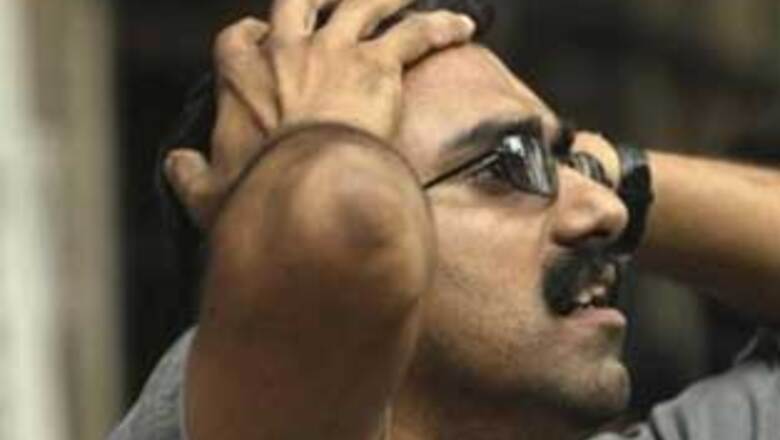
views
L'aquila, Italy/Washington: The slow climb out of the worst recession since World War Two will need solid support from government policies, the International Monetary Fund said on Wednesday, as world leaders meeting in Italy fretted the recovery will not come fast enough.
Wall Street stocks fell on lingering concerns about the nascent recovery and impact of unemployment and slow consumer spending as the second-quarter corporate earnings reporting season was about to begin. European shares posted losses led by financials, oil producers and automakers.
Oil fell below $62 a barrel, with some analysts surmising the drop from last month's peak of $70 showed the economy was not yet out of the woods, and OPEC said world demand for its oil may take years to recover.
In its latest World Economic Outlook, the IMF said economic growth could hit 2.5 per cent in 2010, a more optimistic figure than the 1.9 per cent reported in April. This year, it said, the global economy is likely to decline 1.4 per cent, slightly steeper than the 1.3 per cent contraction it saw in April.
Expectations the recession is bottoming out in Europe's biggest economy received a boost with data showing German industrial output had bounced back strongly in May, up 3.7 per cent, beating analysts' forecasts of a 0.5 per cent gain.
The dollar fell against the yen. The euro initially turned positive on the German data, though it later was down against the dollar and yen, despite the positive industrial growth forecast.
While the unprecedented policy intervention by world economic powers has allowed hope of recovery, the IMF warned against complacency. It suggested policy-makers focus on removing toxic debt from bank balance sheets and look toward tightening budgets in the medium term.
Leaders of the Group of Eight industrial nations, meeting in Italy, essentially agreed, saying the recovery is not yet assured and that it is too soon to unwind economic growth packages. "Significant risks still remain to economic and financial stability," according to a draft document by the G8 -- United States, Germany, Japan, France, Britain, Italy, Canada and Russia.
Rounds of interest rate cuts and trillions of dollars in public funds have helped to prevent the deepest global recession in decades from turning into a depression.
However, doubts that consumers and private businesses will be ready to ramp up spending prompted warnings from the IMF and others that governments would risk killing the recovery if they removed the life-line too quickly.
"It is far too early to declare the return of Germany's growth engine," said Carsten Brzeski, an economist at ING Financial Markets. "The last two days were good news for the future stabilisation of the German economy. For a sustainable recovery, however, much more of the same will be needed."
Fears that steadily rising unemployment may strangle the budding recovery have prompted calls for even more spending.
But White House budget official Robert Nabors told the US Congress the Obama administration was not talking about a second stimulus package and would concentrate on implementing the $787 billion stimulus already in place.
White House spokesman Robert Gibbs said President Barack Obama was "not ruling anything out, but at the same time he's not ruling anything in" on another stimulus. He said Obama "won't hesitate" to take the steps necessary to help the economy. Some Democrats in Congress and an outside adviser to the president on Tuesday raised the possibility of another stimulus package.
Fragile Recovery
On the eve of the G8 summit, British Prime Minister Gordon Brown told Reuters that the world had to wake up to the scale of the downturn and stay focused on restarting growth, although Canada said existing measures must be implemented before any talk of further action.
Signs of the fragility of the recovery were seen world financial markets, oil product stocks, currencies and exports.
Lingering sluggish demand due to the weak economy was blamed for the higher-than-expected US inventories of refined oil products in the week. Distillate supplies, including diesel and heating oil, hit a 25-year high.
At the G8 meeting in L'Aquila, Italy, Russian President Dmitry Medvedev's spokeswoman said he called a $70-$80 per barrel price for oil "fair" but added that oil prices could not be regulated by government administration.
European stock markets fell for a fifth day, and the lowest level in 10 weeks, with the FTSEurofirst 300 1.3 per cent lower. London's FTSE 100 ended 1.1 per cent lower -- 46.77 points down at 4140.23, its third day of losses. Asian stocks tracked Wall Street's sharp Tuesday losses with Japan's Nikkei average sliding 2.4 per cent to a six-week low on Wednesday.
Encouraging data in recent weeks has been tempered by persistent signs of economic weakness, with China and Japan on Wednesday offering contrasting pictures.
Chinese banks in June extended 1.53 trillion yuan ($223.9 billion) in loans as the government seeks to hit an eight per cent growth target this year.
In Japan, the value of its core private-sector machinery orders, a leading indicator of capital spending, slumped 3 per cent in May to a record low, defying expectations of a rise. And company bankruptcies jumped more than 18 per cent in June and were up 7.4 per cent from a year earlier.
A steep drop in exports and corporate investment led to euro zone economy contraction of a record 2.5 per cent in the first three months of 2009, although depleted stockpiles in the 16-nation area raised hopes of a better second quarter.
Britain said it will tighten up how it supervises banks, scrutinize bonuses paid to their employees and punish misconduct more severely to try to prevent a re-run of the credit crunch.
The changes largely apply initiatives already underway at t the European Union and global level to improve supervision of system-wide risks and force banks to hold more capital to avert the need for future government bailouts.
















Comments
0 comment